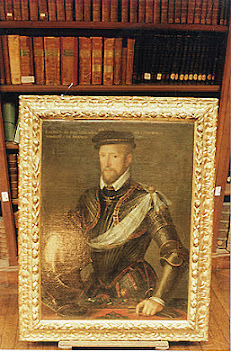BEGGARS, THIEVES AND MARGINALS LIVE OUTSIDE THE WALL, WHERE AUTHORITIES DO NOT VENTURE
Sixteenth-century Protestants join them.
-- Pascal Payen-Appenzeller, pastor and historian of Paris,
gave some of the information here.
Notre-Dame de Paris by Victor Hugo, 1854 ed. |
Saint-Germain must have resembled this "court of miracles."
Adapted from a map of Paris in 1615 / zoom
- They sang hymns in the fields of Saint-Germain and pastors' first meeting took place in that "Little Geneva," a reference to Calvin's republic.
- Many were craftspeople, and living outside the city let them avoid guilds' regulations (History from fresh perspectives says more : Please click here and on the next pages).
- Protestantism continued in Saint-Germain despite Louis XIV's prohibition (in 1684), to avoid clashing with the Scandinavians whose embassies were located there.
# # #
Those Protestants explain Saint-Germain's intellectuality because:
- Their core belief, of personal responsibility for salvation, implied pondering the Bible as opposed to accepting additions to it (Purgatory, the saints, the Papacy, mass...). That point of departure was intellectual in itself.
- That meant being able to read, which most of the population could not. But the craftspeople, shopkeepers and lawyers who made up the mass of 16th-century Protestants in France, were literate.
The Money-Lender and his Wife, Flanders, 1514 / zoom
Money and book, in Flanders not France, and a few years before Luther posts the 95 Theses on the church door, but the social point remains.
- The invention of printing and translation of the Bible into local languages greatly encouraged the new faith.
Expulsion of the Protestants of Toulouse by Antoine Rivalz, the official painter of Toulouse, toward 1725 / zoom
A massacre interrupts a Protestant as he reads — outside a rampart:
# # #
A gift to Paris: the superb Library of the history of Protestantism:
(Built in 1877)
The portrait of the first Protestant military chief (Admiral Coligny) appropriately leans against books, and a class led by the historian mentioned above.
Photo by the mother of the little boy
The director is showing 16th-century documents to German Calvinists, descendants of French Protestants who fled the kingdom when their faith was outlawed (in 1684). One record is the Bible of Henri IV, the Protestant chief who to enter Paris abjured his faith and accepted Catholicism: "Paris is worth a mass," he famously said.
# # #
The educated residents attracted editors and librarians,
then galeries of contemporary art.
©Jeanne Bucher
The famous Jeanne Bucher gallery (to be continued) began as a bookstore in the neighborhood.
Saint Germain became
a neighborhood of intellectuals.


.png)







No comments:
Post a Comment